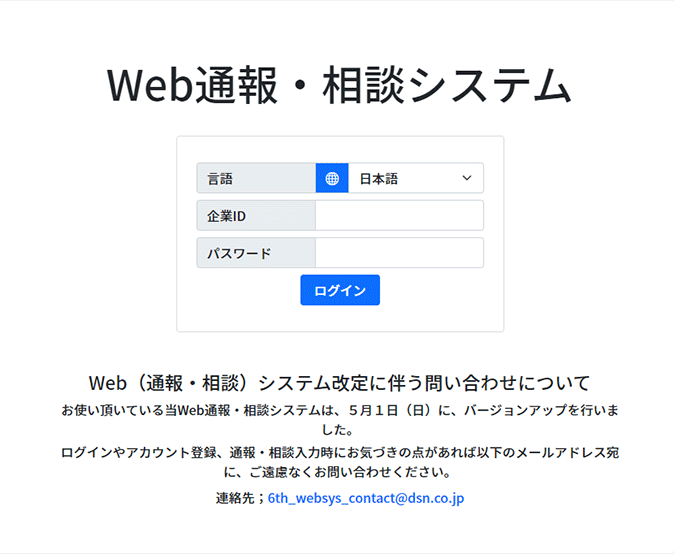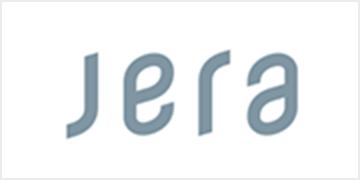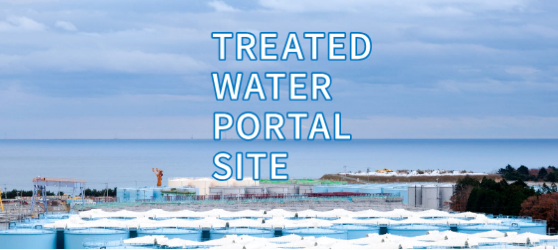Efforts to Respect Human Rights
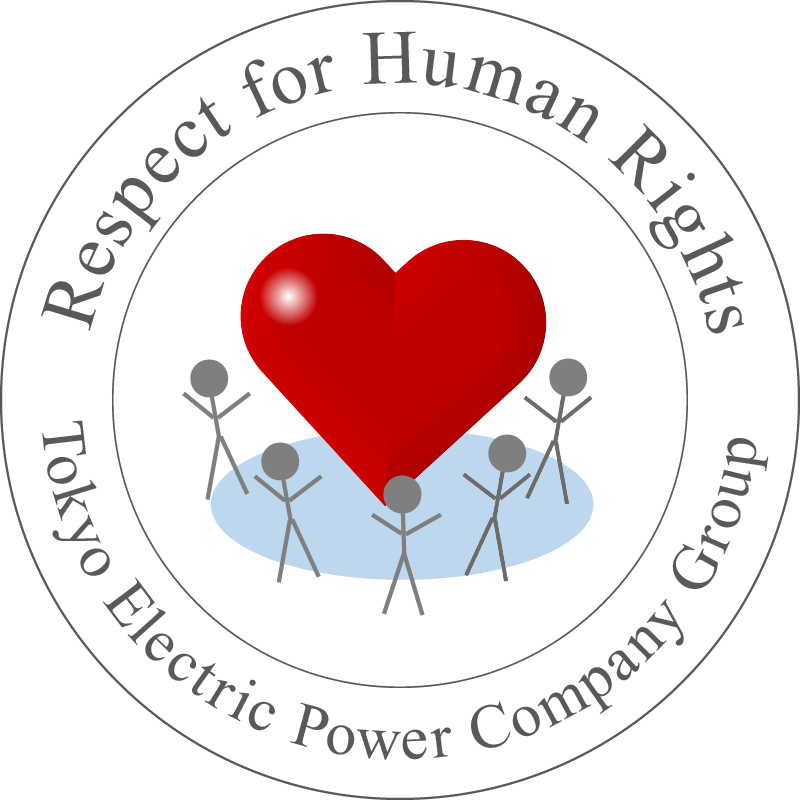
The Tokyo Electric Power Company Group (“TEPCO Group”) established and announced its TEPCO Group Human Rights Policy in August 2021, aiming to contribute to protecting/promoting human rights across society as a whole, including the international community. We aspire to become a corporate group that continues to be trusted and chosen by society and customers, and respect human rights as the basis of our operation.
1. TEPCO Group Human Rights Policy
The TEPCO Group established and announced in August 2021 the TEPCO Group Human Rights Policy (“the Policy”) that clarifies our stance toward efforts to respect human rights, in accordance with the United Nations Guiding Principles on Business and Human Rights. Besides strengthening our previous initiatives for human rights, we will promote human rights-respecting efforts that align with international standards in order to commit ourselves to prevent and mitigate adverse impacts on human rights.
Should the operations, products, or services of not only the TEPCO Group but also our business partners, including suppliers, adversely impact the human rights of our stakeholders including customers and local communities, we will take appropriate actions.
The Policy was established based on international human rights norms and principles (e.g., the International Bill of Human Rights, the International Labour Organization’s Declaration on Fundamental Principles and Rights at Work, and the Children’s Rights and Business Principles), and by incorporating opinions of external experts.
Commitment to Specific Human Rights Issues
The TEPCO Group respects the following rights and human dignities in accordance with international norms and principles on human rights.
- (1) Prohibition of human trafficking, forced labor, and child labor
- (2) Freedom of association and respect for the right to collective bargaining, etc.
- (3) Respect for diversity and equal opportunity
- (4) Prohibition of all forms of discrimination*, harassment, bullying, and unfair treatment
- (5) Appropriate management of working hours and reduction of excessive working hours
- (6) Securing the minimum wage and supporting the living wage
- (7) Ensuring a healthy and safe work environment
- (8) Protection of personal information and privacy
- (9) Ensuring the safety of consumers and local communities and disclosing information transparently
-
*
Discrimination on the basis of race, color, sex, language, religion, nationality, age, sexual orientation, gender identity, sexual expression, disability, political or other opinions, national or social background, property, family or other status, or any similar reason.
Relevant regulations
2. Governance Structure of Respect for Human Rights
With the establishment of the Policy, we reorganized our Human Rights Awareness Committee, the primary goal of which has been to resolve/prevent issues such as discrimination, and accordingly set up the TEPCO Holdings (TEPCO HD) Human Rights Committee (“HD Human Rights Committee”) in February 2022. Because of the broad scope of human rights issues, we expanded its membership to include the heads of our procurement, ESG, safety, and system security organizations.
The HD Human Rights Committee, chaired by the Chief Human Resources Officer (“Human Rights Chairperson”), chiefly consists of TEPCO HD’s relevant department/office managers and human rights directors of TEPCO Power Grid, TEPCO Renewable Power, and TEPCO Energy Partner (these three are the “core companies”). Each core company has its own human rights committee, and the committee chairs also serve as members of the HD Human Rights Committee.
As a general rule, the HD Human Rights Committee meets twice a year to engage in such activities as reviewing efforts from the previous fiscal year, deliberating plans for the current fiscal year, and monitoring the action plan for human rights due diligence (“human rights DD”).
The Committee also shares specific cases submitted to our Human Rights Reporting Desk and Human Rights Consultation Desk and discusses and recommends remedial measures.
Items reviewed/decided upon by the HD Human Rights Committee are reported to the Executive Committee and other bodies, if necessary. (A report on actions taken after the Policy’s establishment up through FY2022 was made to the Board of Directors on April 28, 2023.)
System of human rights governance
- PG: TEPCO Power Grid, Inc.
- RP: TEPCO Renewable Power, Inc
- EP: TEPCO Energy Partner, Inc
-
Note:
Coverage includes consolidated subsidiaries of the core companies
Here are the details on past HD Human Rights Committee sessions.
| Date | Agenda | Attendance |
|---|---|---|
| First Session: Feb. 9, 2022 |
|
24 out of 24 (2 by proxy) |
| Second Session: June 13, 2022 |
|
24 out of 24 (3 by proxy) |
| Third Session: Nov. 25, 2022 |
|
24 out of 24 (6 by proxy) |
| Fourth Session: May 26, 2023 |
|
24 out of 24 (4 by proxy) |
| Fifth Session: Nov. 13, 2023 |
|
24 out of 24 (3 by proxy) |
| Sixth Session: May. 16,2024 |
|
23 out of 23 (3 by proxy) |
| Seventh Session: Mar. 17,2025 |
|
23 out of 23 (10 by proxy) |
Provided below are the recommendations/remedial measures based on discussions from previous HD Human Rights Committee sessions.
- For stronger governance, we recommended responsible divisions to make human rights grievance systems better recognizable and widely known to employees.
- Reflecting opinions from visually impaired individuals, we made an organization-wide recommendation about how to communicate information that many employees view in particular (e.g., organization chiefs’ messages on the intranet).
- Reflecting grievances filed by contract staff, we communicated about thoroughly practicing the contract management manual.
- In response to stakeholder feedback suggesting that a consolidated subsidiary’s product leaflet could be perceived as discriminatory by some recipients, we replaced a problematic photo in the leaflet when it was updated, and held a training on the content in question.
Reference
3. Human Rights Due Diligence
The TEPCO Group respects human rights in all aspects of its business activities. We built a human rights DD mechanism based on the United Nations Guiding Principles on Business and Human Rights so that the human rights of all stakeholders, including people impacted by our business activities, are respected. We also defined ”our companies,” “consolidated subsidiaries,” and “suppliers” as the scopes of our priority responses in this area.
The TEPCO Group’s system for respecting human rights
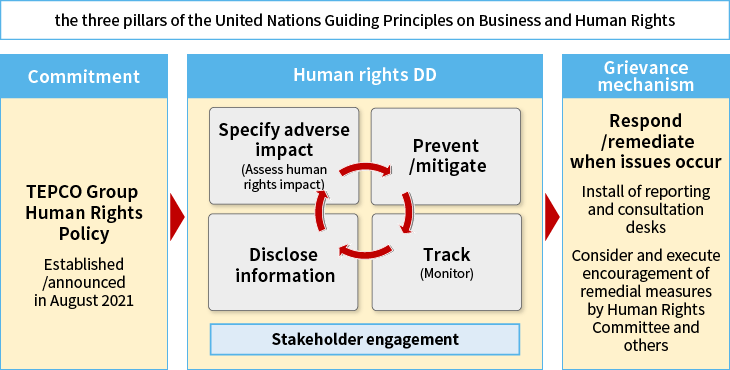
Scopes of priority response for human rights DD
Our group conducts human rights impact assessments and engagement activities based on the human rights issues outlined in our human rights policy, focusing on the following priority areas.
-
*
Our company: TEPCO Holdings and its Four core operating companies(TEPCO Fuel & Power, TEPCO Power Grid, TEPCO Energy Partner, and TEPCO Renewable Power.)
Human Rights Impact Assessments on Our Companies (Employees)
To implement human rights DD for our companies (employees), we specified adverse impacts caused by our business (human rights impact assessments). With the input from external experts, we analyzed our internal rules, results of employee opinion surveys, previous lawsuits, and contents of human rights grievances, among other information. We accordingly identified human rights issues and assessed them from the perspectives of the potential, scale, scope, and irremediability of human rights violations.
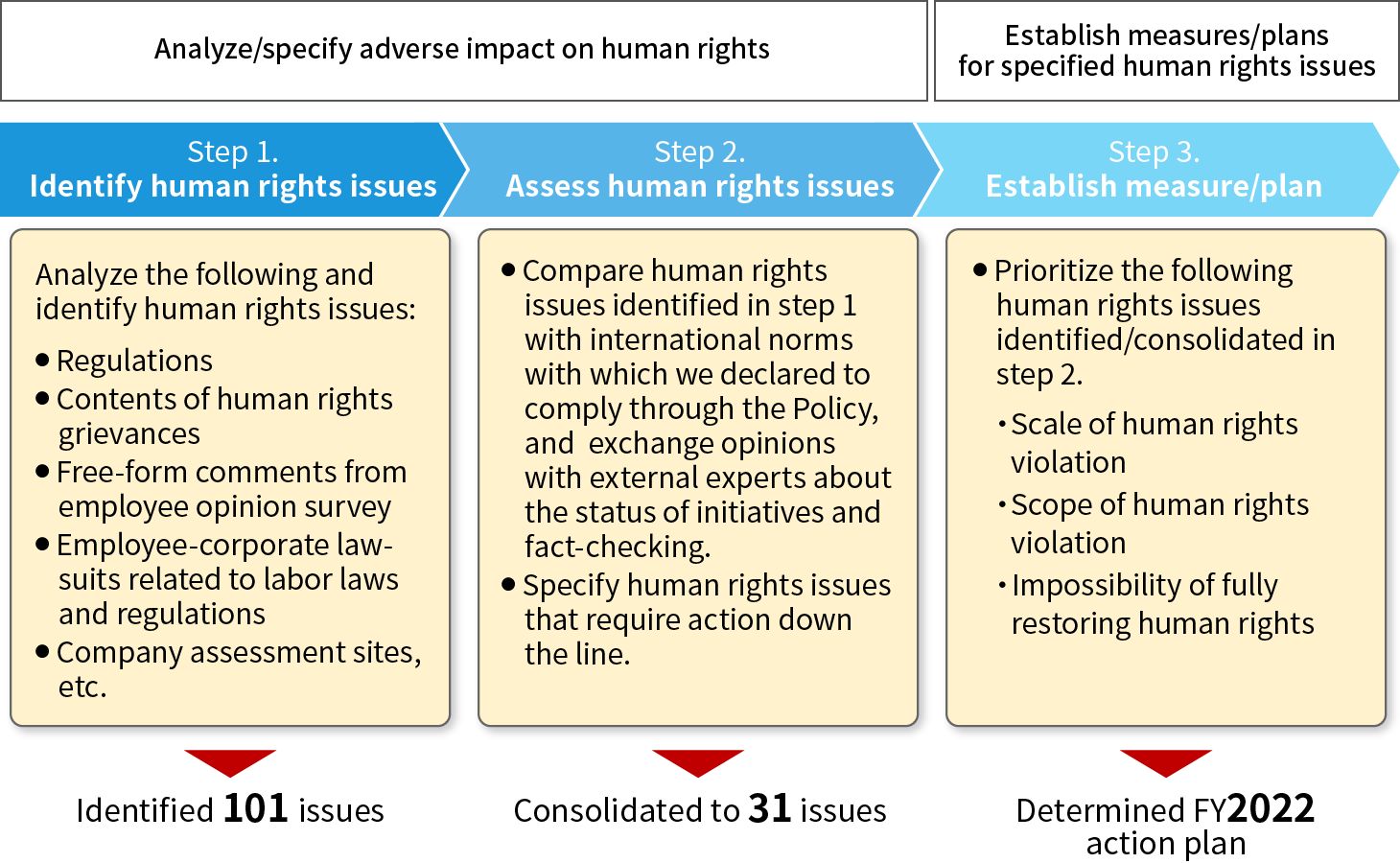
As a result, assessments showed particularly significant adverse impacts in the categories of harassment, working hours, and proper management of personal information. We have been addressing these three challenges for some time, and since FY2022 we have defined them as salient human rights issues and stepped up our efforts focused on preventing inappropriate cases related to them and minimizing impacts when such cases occur.
Human Rights Impact Assessments on Our Companies (Business)
Our company conducts human rights impact assessments through the following process.
-
(1)Conducting a Human Rights Self-Assessment
We carry out a self-assessment based on key human rights issues that companies are expected to consider, as outlined in international standards and guidelines (such as the UN Guiding Principles and OECD Guidance). -
(2)Interviews by External Experts
Based on the results of the self-assessment, external experts conduct interviews to identify items that each department considers to be potential human rights issues. - (3)We use findings from (1) and (2) to assess issues in terms of the potential, scale, scope, and irremediability of human rights violations, identify and prioritize critical human rights issues, and formulate an action plan.
Coverage Rate of Human Rights Impact Assessments to Date
In the fiscal year 2024, a Human Rights Self-Assessment was conducted across all headquarters departments of the TEPCO Holdings and core operating companies. The combined implementation rate for TEPCO Holdings and the core operating companies was 56.0%.
In FY2025, the assessment will be expanded to cover all departments of HD and the core operating companies, including frontline workplaces, with the goal of achieving a 100% implementation rate.
| HD | Conducted across all headquarters departments | 100% |
|---|---|---|
| PG | Distribution Department, Transmission Department, Real Estate Acquisition & Management Department, Electronic Telecommunications, Customer Service Department, Internal Audit Office, Policy Secretariat & Risk Management Office, Business Planning Office, Engineering Office, Innovation Promotion Office, Business Management Office, Human Resources Development Office, Procurement Office, Business Development Office, International Business Development Office, Cyber Security Center, Smart Meter Promotion Office, Power System Operation Department | 33.3% |
| RP | Hydro Power Department,Wind Power Department,Internal Audit Office,Business Planning Office,Innovation Promotion Office,Business Management Office,International Business Development Office | 45.9% |
| EP | Corporate Marketing and Sales Division, Customer Marketing and Sales Division, Carbon Neutral Marketing and Sales Department, Wholesale Electricity Marketing and Sales Office, Business Management Office, Internal Audit Office, Gas Business Department, Service Solutions Division, Business Transformation Division, Kaizen Promotion Office, Energy Procurement & Operation Department, Business Planning Office, Digital Transformation Promotion Office, Customer Experience Enhancement Office, Human Resources Strategy and Development Office | 59.5% |
Based on our efforts to date, we have confirmed that issues involving actual or potential adverse impacts on human rights, as well as those related to legal compliance, are being addressed appropriately.
In addition, for initiatives considered “desirable” under international standards such as the UN guiding principles, we are working with relevant departments to determine priorities and approaches for implementation.
Going forward, we will promote internal understanding of the “TEPCO Group Human Rights Policy” through expanded employee training and self-assessments. We will also strive to operate our business in a manner that respects the human rights not only of our own employees and organizations, but also of external stakeholders involved in our business activities.
Examples of Responses from Various Departments
-
○ Expansion of Power Plant Facilities with a Focus on Diversity
-
At hydroelectric power plants and dam facilities located in mountainous areas, it was identified that restroom facilities were inadequate for our female employees, causing them discomfort.
In response, a working group, led primarily by female employees, was formed to review and implement environmental improvements.
-
At hydroelectric power plants and dam facilities located in mountainous areas, it was identified that restroom facilities were inadequate for our female employees, causing them discomfort.
-
○ Measures to Support Foreign National Employees
- To ensure proper understanding of operational risks and enhance safety awareness, we created and distributed multilingual versions (English and Vietnamese) of the “Five Key Safety Principles”.
- Materials outlining safety precautions based on past incidents were made more visually accessible through the use of photos and illustrations. and translated into workers’ native languages to facilitate understanding.
- To improve the awareness of and trust in our consultation services at overseas offices, we provided information about these services in English. This helped to enhance the psychological safety for our employees at international locations.
-
○ Measures Against Risks in Procuring Solar Panels
-
We have formulated a policy for procuring electricity through solar power generation (excluding the FIT scheme), and are implementing measures in line with this policy.
This measure was taken to mitigate potential risks in solar panel procurement.
-
We have formulated a policy for procuring electricity through solar power generation (excluding the FIT scheme), and are implementing measures in line with this policy.
-
○ Response to Human Rights Risks Among Business Partners
- We have established a system to promptly share any emerging risks with subsidiaries that are closely connected to our business model. In addition, we actively communicate about these risks to ensure that the human rights of all individuals involved across the entire value chain are respected.
-
○ Initiatives to Strengthen Our Response to Human Rights Risks
- We have assigned risk managers within our organization to not only respond to manifest risks but also to detect potential risks at an early stage. A reporting system has been established to escalate such risks to the headquarters risk line through these managers.
- We have conducted a risk identification and assessment human right issues related to our overseas affiliates. We share the findings internally with relevant personnel and work to strengthen our response to these risks.
-
○ Proactive Acquisition of Risk Information from Business Partners
- We collect opinions and requests during regular discussions with our business partners, and strive to identify and understand potential risk information.
-
○ Overseas Initiatives to Promote Respect for Human Rights
- Even for overseas affiliates where our equity stake is limited, we actively promote respect for human rights through our assigned directors.
Initiatives at the Fukushima Daiichi Nuclear Power Station Pertaining to Respecting Human Rights (January 2024 update)
The decommissioning work underway at the Fukushima Daiichi Nuclear Power Station (“Fukushima Daiichi”) is supported by numerous contractors. Approximately 4,500 workers are engaged at the plant on any given week day (as of November 2023) and the TEPCO Group has been making, and will continue to make, significant efforts to improve the work environment at the Fukushima Daiichi.
Initiatives implemented to date.
-
(1) Initiatives to listen to the opinions of workers and make improvements
We have set up suggestion boxes and conduct questionnaires for all workers to voluntarily submit and communicate their opinions to TEPCO, and we provide feedback to workers on the status of response to their opinions.
-
(2) Relief mechanism for workers
We regularly inform all workers of the existence of a consultation desk for health management and working conditions, etc. through posting leaflets and the Occupational Health and Safety Promotion Council, of which the prime contractors are members.
-
(3) Compliance with laws and regulations, and reminding workers of these through prime contractors
TEPCO reminds workers of the importance of compliance with laws and regulations through addresses at the Occupational Health and Safety Promotion Council of which the prime contractors are members, legal compliance seminars held in cooperation with the Fukushima Labor Bureau, distribution of related pamphlets, and other activities.
-
(4) Efforts to eliminate occupational accidents by placing the highest priority on safety
Each time an accident occurs, TEPCO investigates the cause, formulates measures to prevent recurrence, thoroughly disseminates information on them, and ensures that they are reflected in the annual safety action plan in an appropriate manner.
-
(5) Appropriate radiation control based on laws and regulations
Radiation workers working in controlled areas are registered under the "Radiation Dose Registration Control System", and each time they enter such an area, they are fitted with personal dosimeters to measure their exposure doses and to ensure the accumulated doses for each individual will not exceed the regulatory limit.
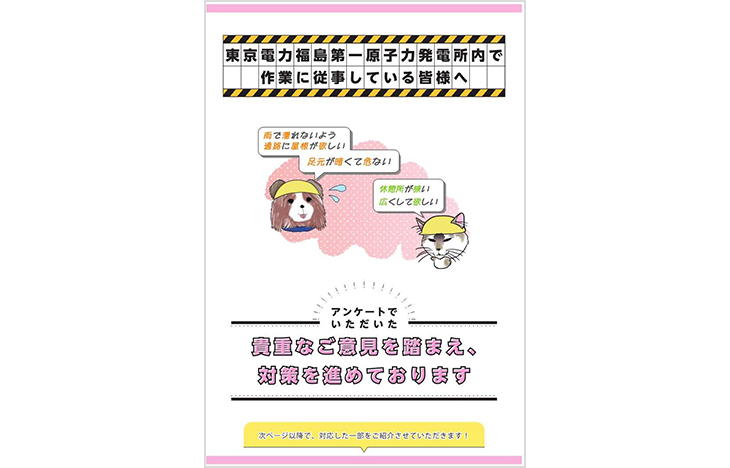
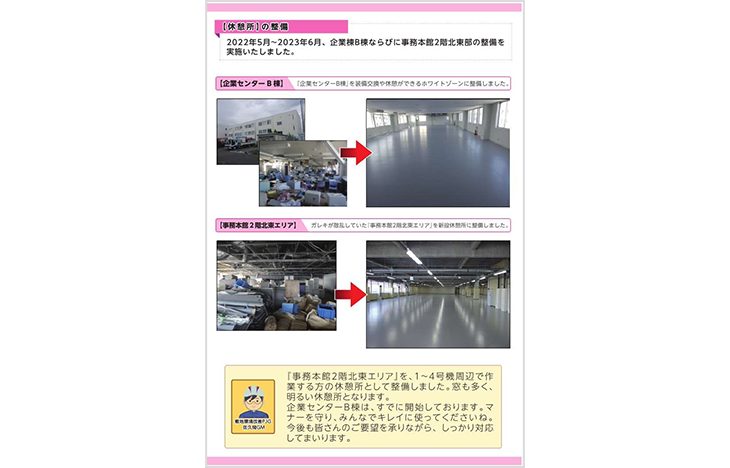
“To everyone working at the Fukushima Daiichi: We are implementing measures based upon your opinions conveyed through the questionnaire.”
In response to requests elicited through worker questionnaires, we have built a covered walkway, installed lighting, and established rest areas. The results of questionnaires are provided to workers as feedback.
In coordination with the Ministry of Health, Labor and Welfare’s Fukushima Labor Bureau, we have created a pamphlet on disclosing labor conditions and appropriate wage rules, etc., and have distributed it to workers.
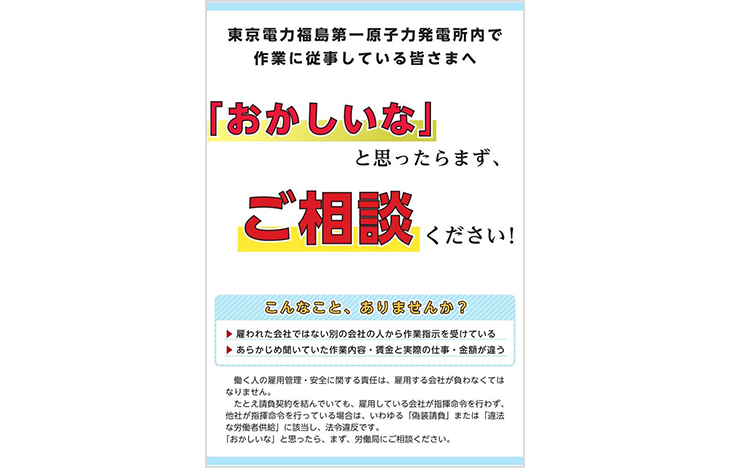
“To everyone working at the Fukushima Daiichi: If you notice anything out of place, please let us know!
In the area where workers wait for the site shuttlebus, we have posted a leaflet on the “Industrial Accident Compensation Insurance for Illnesses Caused by Radiation Exposure” to raise awareness.
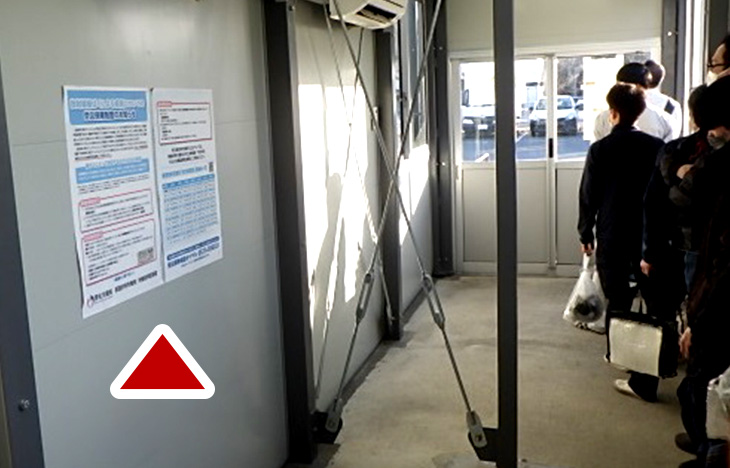
In order to complete the decommissioning of the Fukushima Daiichi, which is a key management issue, we are reviewing work processes from the perspective of respecting human rights and are deliberating/implementing enhancement measures in order to further protect human rights.
Three measures to enhance respect for human rights
-
(1) Enhancing cooperation with the prime contractors to ensure respect for workers' human rights (December 14)
Conducting human rights training, etc., at the Occupational Health and Safety Promotion Council etc.
-
(2) Enhancing the system to take on board workers' opinions
Constructing a system that makes it easier for workers to express their opinions in questionnaires, etc., while taking human rights into consideration.
-
(3) Enhancing the system to enable workers to engage in consultation without anxiety
Introducing methods of public notice that make it easier for workers to seek advice, such as the use of digital signage and considering reviewing leaflets, in a way that takes human rights into consideration
In conjunction with Human Rights Day (December 10), the Occupational Health and Safety Promotion Council held a meeting for approximately 60 prime contractors. The Fukushima Daiichi Nuclear Power Station Site Superintendent attended the session, during which the Human Rights Officer of TEPCO Holdings (“TEPCO HD”) explained the TEPCO Group Human Rights Policy and requested the contractors’ cooperation in promoting respect for human rights.(December 14, 2023)
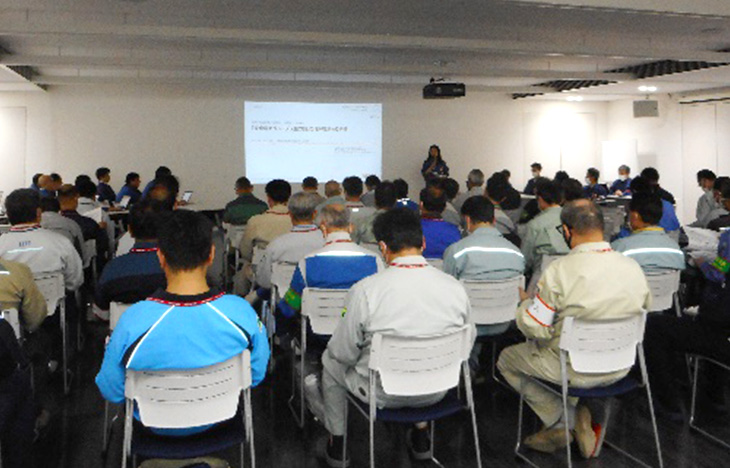
The TEPCO HD Human Rights Officer and the Work Environment Improvement Officer from TEPCO HD’s Fukushima Daiichi Decontamination and Decommissioning Engineering Company inspected the work environment to assess progress and identify areas for further improvement.
Results from the workers’ questionnaires have been posted on every floor of the large rest house, enabling workers to review them.
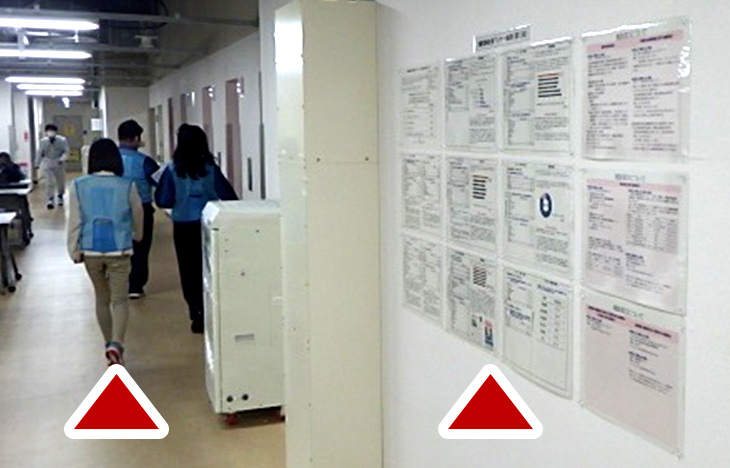
We have started to enhance the utilization of digital signage, enabling us to proactively display email addresses for the “Suggestion Box” and inform workers of the various consultation desks.
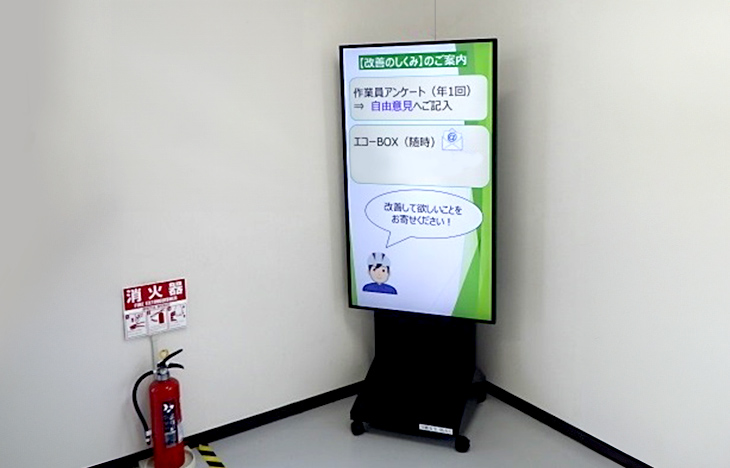
“Information about improvement triggers. Let us know areas for improvement.”
We have revised the leaflet that gives information on the various consultation desks.
< Prior to revision >
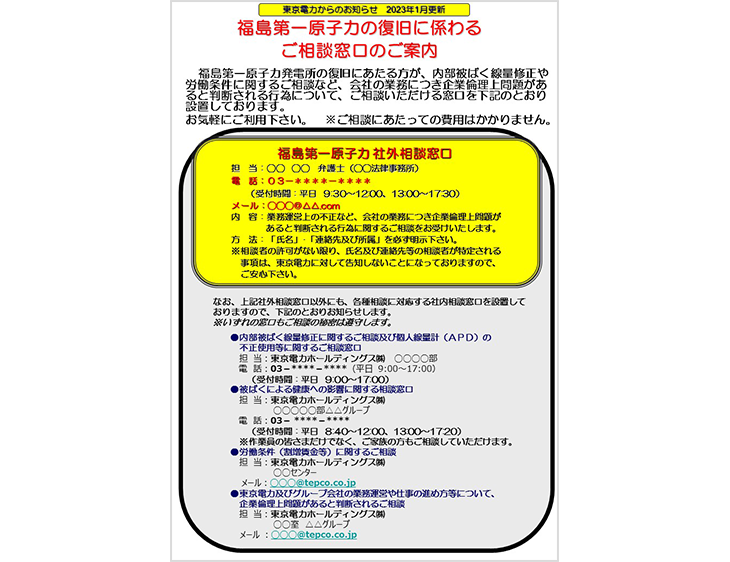
< After revision >
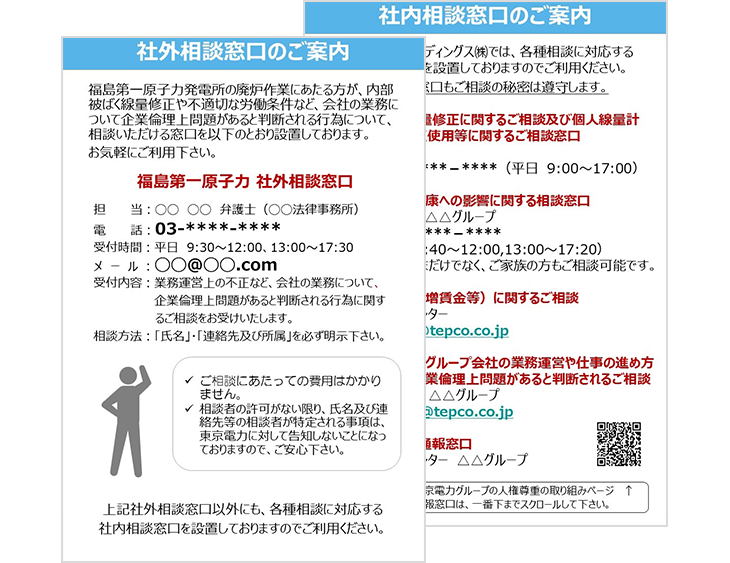
“We have established consultation desks both inside and outside the company for actions that have been deemed to infringe upon corporate ethics, such as internal exposure dose falsifications and unsuitable labor conditions, etc. Please feel free to use these services.”
- Free of charge
- Unless express permission is given by the consulting party, no information, such as the name or contact information of the consulting party, will be disclosed to TEPCO, so please be assured that your information will be kept confidential.
(Issues pertaining to impact on health from exposure, such as internal exposure dose falsifications, etc., working conditions, corporate ethics, human rights, etc.)
- The font has been enlarged to make it easier for the elderly to see, and the pamphlet has been colored blue to bring about a feeling of ease and accommodate people with color vision variation.
- The “Consultation Desk for Notification of Issues Pertaining to Human Rights” has been added along with a QR code to make information easy to access.
Human Rights Impact Assessments on Consolidated Subsidiaries
- Following the previous year (FY2021), in FY2022 we conducted a “Human Rights Respect Self-Assessment” targeting 38 major consolidated subsidiaries that fall within the scope of "TEPCO Group Human Rights Policy" and are also suppliers and business partners of TEPCO Holdings and its core operating companies. The assessment covered 72 items, including internal systems for respecting human rights, human rights initiatives related to suppliers, and the status and responses to the nine human rights issues committed to in our Human Rights Policy.
-
Taking into account the unique characteristics of each consolidated subsidiary based on factors such as company size, year of establishment, and business nature, it is necessary to identify each subsidiary's challenges and formulate and implement appropriate measures. For this reason, we have been conducting individual interviews with priority assigned to each subsidiary since the fiscal year 2022.
In FY2022, interviews were conducted with 7 companies, in FY2023 with 17 companies, and in FY2024 with 3 companies, completing a full cycle of major consolidated subsidiaries over three years. - In FY2023, each subsidiary appointed a “human rights officer” to enhance collaboration with TEPCO Holdings , and we developed the “TEPCO Group Human Rights Policy Implementation Guidelines” to promote autonomous human rights initiatives within each subsidiary.
- In FY2024, based on the guidelines, each subsidiary formulated its own human rights action plan, and HD began monitoring these efforts. Additionally, an English version of the guidelines was created for overseas subsidiaries.
System for Promoting Respect for Human Rights at Consolidated Subsidiaries
Reference
Human Rights Impact Assessments on Suppliers
We established the Sustainable Procurement Guidelines (the “Guidelines) in May 2021 by adding an element of respect for human rights to the Basic Policy on Procurement, with the aim to develop stronger respect for human rights in our supply chain. We also developed a system to reinforce our suppliers’ respect for human rights and started to take action in FY2022. Example endeavors include having suppliers submit a confirmation document that declares they are properly practicing the Guidelines, and distributing a Sustainable Procurement Questionnaire to check the extent to which suppliers are complying with the Guidelines.
System to Reinforce Suppliers’ Respect for Human Rights
- We apply the PDCA cycle to develop stronger respect for human rights in the supply chain.
- The PDCA cycle is run as a three-year cycle.
Provisions related to human rights compliance were added to contractual agreements.
We have previously obtained confirmation letters from suppliers as proof of their commitment to uphold the spirit of the "TEPCO Group Sustainable Procurement Guidelines"
Starting in FY2024, we have strengthened contractual obligations by incorporating human rights compliance provisions directly into our contracts. Specifically, these provisions stipulate that contractors must comply with the UN Guiding Principles and conduct human rights due diligence (DD) within their contractual supply chains under their own responsibility.
Furthermore, in cases where human rights due diligence reveals adverse human rights impacts, or if human rights violations are identified in the contractor’s business activities, the contractor is required to promptly report to the client, formulate a corrective action plan, and implement it. These requirements are clearly stated in the contract clauses and agreed upon with suppliers at the time of contract execution.
Results of Sustainable Procurement Survey
In FY2022, we asked approximately 300 suppliers to complete a roughly 60-item Sustainable Procurement Survey on seven areas—human rights, CSR, compliance, occupational health & safety, the environment, risk management, and sustainable growth across the entire supply chain—and on their contributions to local communities. The results indicated that the larger the company is, the more likely it is to have a balanced commitment across the board for all areas.
■ Feedback to survey respondents
In FY2022, we received responses from approximately 300 companies to around 60 questions covering human rights, CSR, compliance, occupational health and safety, environmental issues, risk management, and contributions to sustainable development and local communities across the entire supply chain.
In FY2023 and FY2024, the number of responding companies increased to approximately 650 each year.
Overall, the results revealed that the larger the company, the more consistently it engages with all of these areas.
Feedback resources
Benchmarked radar graph
Three values shown:
- Overall average
- Average of companies sized similar to yours
- Your company
Example of a feedback radar chart

Human rights training material
Of the seven areas covered by the survey, it was found that there was room for improvement in measures for the area of human rights. In response, a material for use in human rights training was provided to the suppliers along with the survey feedback.
The material also contains information on the Human Rights Reporting Desk, which offers service to all stakeholders, including suppliers.
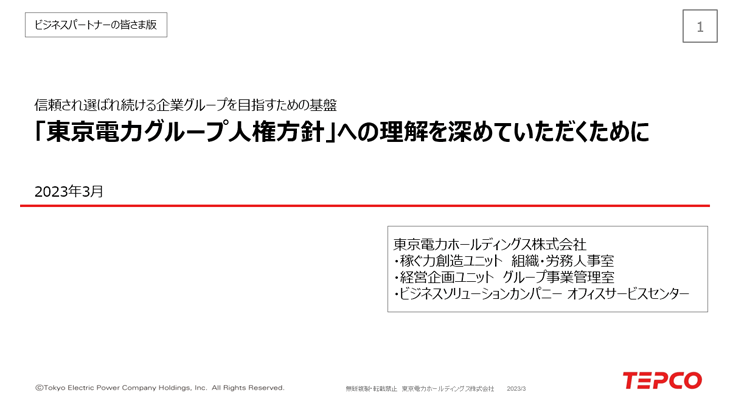
■ Dialogue Implementation
The scoping of human rights due diligence (DD) for suppliers was conducted based on the OECD Due Diligence Guidance for Responsible Business Conduct, considering three key perspectives: sector/business characteristics, products, and geographical factors.
In addition, tools such as the UNEP FI Human Rights Guidance Tool and FTSE Risk Exposure were utilized and analyzed. As a result, in FY2022, the construction sector was concluded to be of high priority.
| Issues | Occupational health & safety, worker exploitation through subcontractor chains, foreign worker issues, etc. |
|---|
In FY2022 we engaged with six suppliers based on the results of the Sustainable Procurement Survey.
Through this we learned that smaller enterprises in particular tend to be behind the curve in how they commit resources to this area.
In FY2023, we engaged with three suppliers handling batteries, focusing on the issues of “responsible mineral sourcing,” “child labor,” and “forced labor.”
In FY2024, we conducted engagement with four suppliers, addressing key issues such as “human rights,” “environment,” and “risk management.”
Going forward, we will continue implementing the initiatives below to highlight the necessity of human rights DD in our supply chain, and provide guidance and assistance where needed.
| Our initiatives | Expected outcomes |
|---|---|
| Company-specific feedback on the Sustainable Procurement Survey results | Objective recognition of own company's strengths and weaknesses |
| Distribution of human rights training material (information on the policies and the Reporting Desk) | Promotion of understanding of the TEPCO group's commitment to respecting human rights |
| Continuous engagement | Enhancement of communication with suppliers, identification of potential risks within our supply chain, and promotion for implementation of human rights due diligence |
Procurement-related policies
| Basic Policy on Procurement |
|
|---|
4. Grievance Mechanism
The TEPCO Group has established both internal and external grievance mechanisms to respond appropriately to human rights-related issues. In addition to ensuring the anonymity of clients or whistleblowers and the confidentiality of the content of their reports, we thoroughly protect the clients or whistleblowers and prohibit unfavorable treatment and retaliation against them.
If it becomes apparent that the TEPCO Group’s operations have caused or were involved in an adverse impact on human rights, we will engage in remediation and redress through appropriate procedures and dialogues.
Primary Consultation and Reporting Contacts for Human Rights
| No. | Name | Availability | Format of consultation | Open to |
|---|---|---|---|---|
| 1 | External | On our website (Reports are posted) | All stakeholders | |
| 2 | Human Rights Consultation Desk | Internal | Officers and employees of TEPCO HD and its core operating companies | |
| External | phone (Accepted on holidays / after-hours) | |||
| Reference | ||||
| 3 | Corporate Ethics Consultation Desk | Internal | e-mail, phone (Currently suspended), intranet, postal mail | All individuals involved in or associated with the work of the TEPCO Group |
| External | e-mail, phone | |||
| 4 | Working Hours Consultation Desk | Internal | phone, intranet | |
| 5 | Internal | On our website (Reports are posted) | Executives and employees of TEPCO Holdings and its core operating companies | |
Flow of Response to Consultations and Whistleblower Reports
Response System for Consultation and Whistleblower Reports
- TEPCO HD’s Human Rights Coordinator (“the HRC of HD”) responds to consultations and whistleblower reports by coordinating with the relevant workplace’s human rights officer (who co-serves as the corporate ethics officer), in a manner mindful of the human rights of the person consulting or reporting.
- A veteran employee with management experience serves as the HRC of HD.
- Female managers are assigned to serve as counselors.
- This mechanism also handles consultations on sexual minority-related matters.
- To make it easier for employees to access this mechanism, a link to it was added to the intranet’s top page, just below the President’s message, in July 2022.
- Contact information for human rights consultation/whistleblowing was added to the Corporate Ethics Card distributed to all employees when it was updated in October 2022.
The Human Rights Reporting Desk and the Human Rights Consultation Desk (see 1 and 2 in the above table) received 103 grievances cases in FY2022.
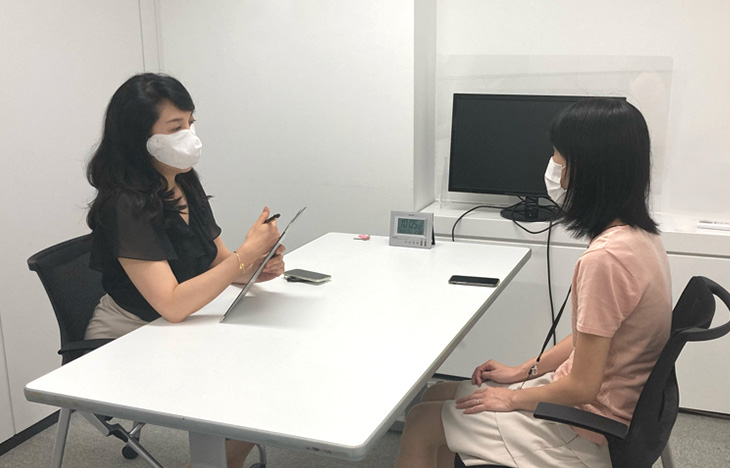
An example of Grievance Mechanism
(Female managers are assigned to serve as counselors.)
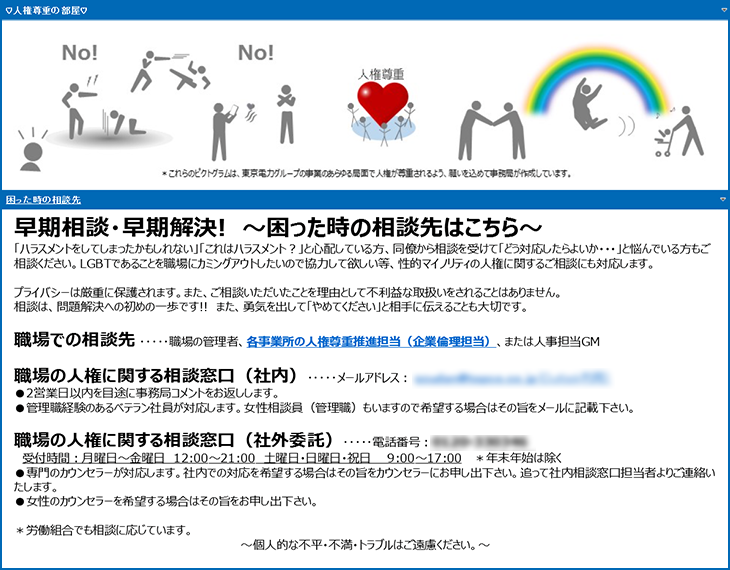
Under the slogan "Early Consultation, Early Resolution!", various contact points are introduced on the intranet as "consultation points in case of trouble"
Number of consultations/reports handled (FY2024)

“Harassment” encompasses power*, sexual, maternity, gender, and other forms of harassment.
-
*
power harassment refers to workplace bullying or abuse of authority.
Breakdown of service users (FY2024)

Disciplinary actions for harassment are prescribed in our rules of employment. Our preventive measures include raising employee awareness by periodically posting information on the intranet regarding disciplinary actions taken. Of the cases handled through our human rights consultation/whistleblowing mechanism, disciplinary action was taken against two cases in FY2021, and none in FY2022.
5. Stakeholder Engagement
We strive to engage in dialogue with all stakeholders, including workers’ representatives, suppliers and other business partners, and local communities, so that we can understand and respond to the human rights-related impacts of the TEPCO Group’s operations from the perspective of the affected stakeholders. We also refer to the opinions of external experts.
We recognize that the working conditions and safety of contractors are human rights issues peculiar to our industry. Through interviews, we will deepen our understanding of the situation and take further action.
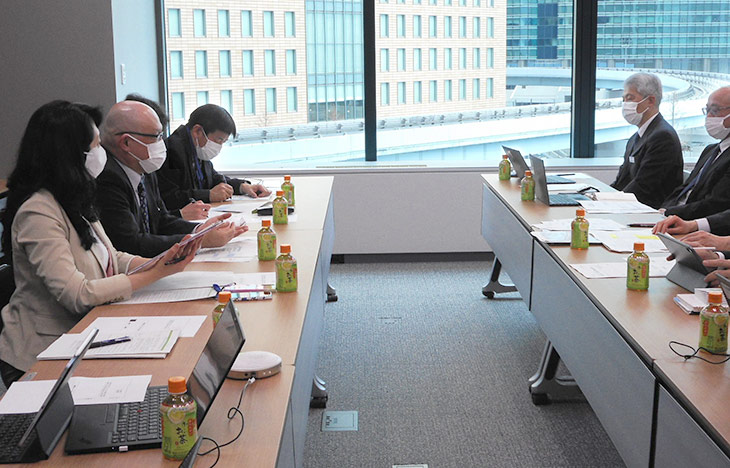
Exchange of opinions with six firms in construction, a high priority sector for human rights DD by the electric power industry
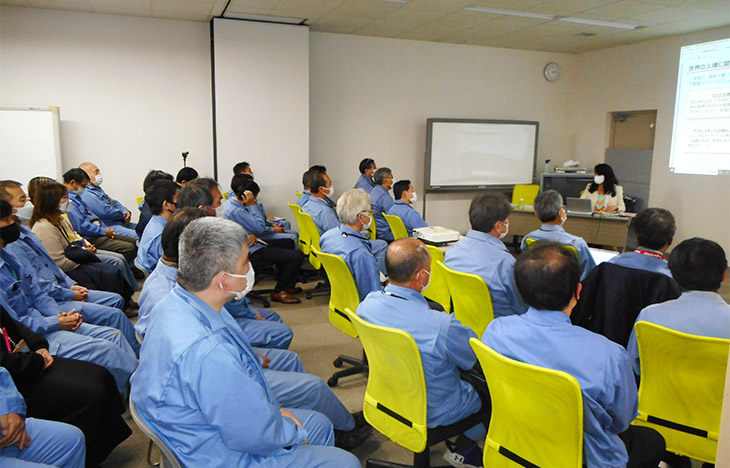
In-person training for supplier employees to strengthen their human rights awareness, as part of our efforts to help suppliers advance their own initiatives
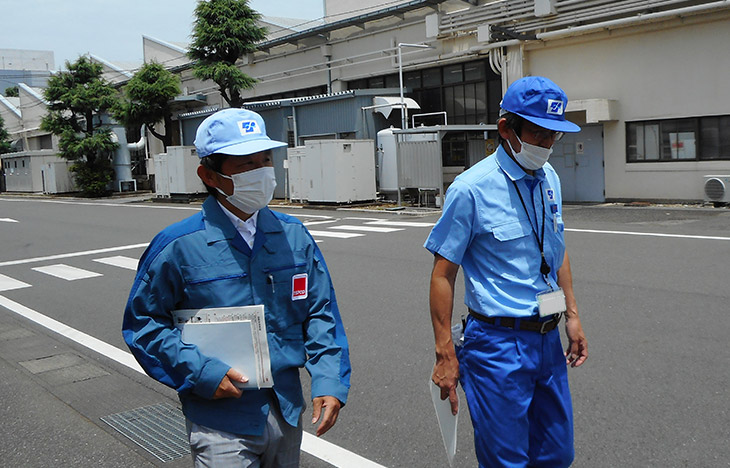
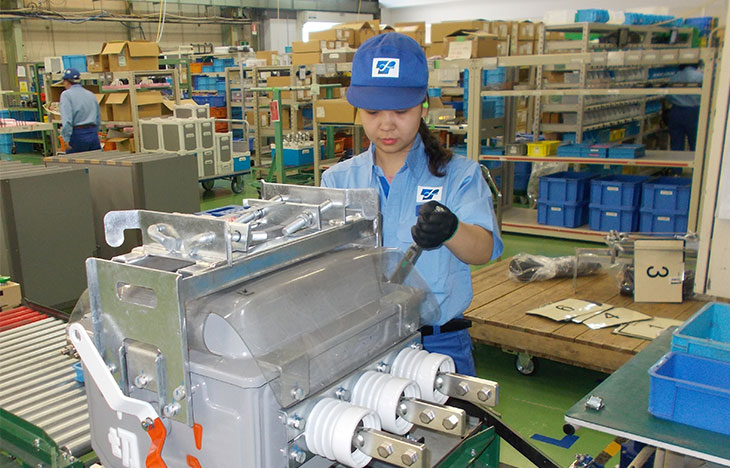
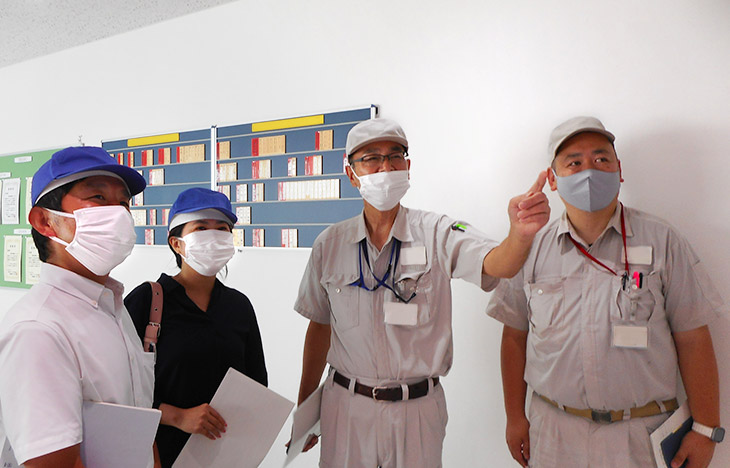
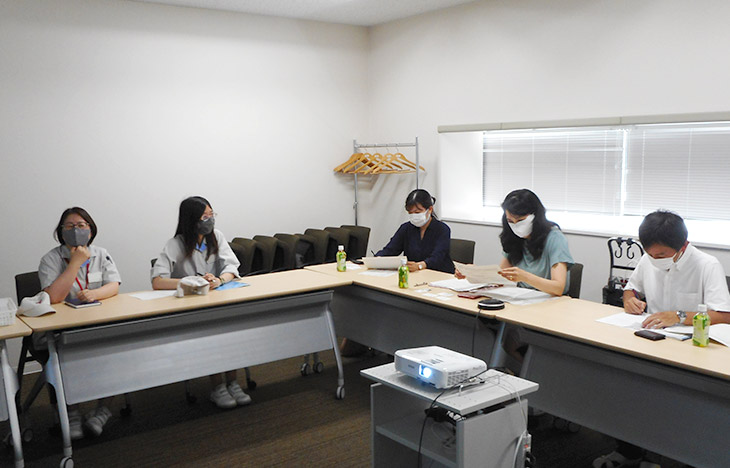
A visit to a supplier’s electric power equipment plant to ascertain working conditions for foreign workers through interviews with foreign employees/technical trainees and their managers
6. Information Disclosure

We use our website (this webpage) and other channels to periodically disclose information about the process of efforts made based on the Policy and results of assessments on their effectiveness.
We will also disclose our efforts on sources such as the Integrated Report and Corporate Governance Report.
7. Information Dissemination/Education on the Policy
The TEPCO Group provides appropriate education and training to all officers and employees so that the Policy permeates the company. We will also not only incorporate this policy into related policies, procedures, and tasks to properly embed it in our operations, but also work on building the capability of individuals in charge of human rights DD for the effective implementation of human rights DD. Moreover, we will strive to respect human rights throughout the supply chain by thoroughly communicating the contents of the Policy to our business partners, including suppliers.
Commitment of Top Management
- Taking advantage of Human Rights Week, the Representative Executive Officer and President of TEPCO HD issued human rights messages on the intranet on December 1, 2021 and December 2, 2022.
- The leadership of many consolidated subsidiaries also sent out similar messages. (14 companies in FY2021, 21 in FY2022)
Training
- Ahead of establishing the Policy, we invited an external lecturer and hosted a training for directors entitled “Why do we need to respect human rights now?” (May 2021)
- We hosted an e-learning training to develop deeper understanding of the Policy for all employees (including temporary employees, part-time workers, and temporary staff) of TEPCO Holdings, core operating companies, and consolidated subsidiaries to which the Policy applies. (2021 4Q)
- In FY2022 we held training for officers of TEPCO HD, RP, PG, EP, and Group companies to advance initiatives for respecting human rights as a group-wide effort. This drove an increase in the human rights initiatives independently conceived and run at the workplace level.
- In FY2023, we conducted harassment prevention training for managerial staff responsible for ensuring proper workplace operations. The training aimed to deepen their understanding of how to prevent harassment and respond appropriately when it occurs.
- In FY2024, we implemented an e-learning program for all employees to enhance their understanding of the “TEPCO Group Customer Harassment Policy,” which was published on October 1, 2024, and to learn specific methods for addressing customer harassment.
- Additionally, we expanded the scope of the harassment prevention training conducted in the previous year for managerial staff to include team leaders—those who assist managers and provide guidance and support to team members. This expansion aimed to improve and elevate the level of understanding among core personnel who play a central role in leading the workplace.
Other Human Rights Trainings Held
| Target | Content・Attendance | |||||
|---|---|---|---|---|---|---|
| FY2022 | FY2023 | FY2024 | ||||
|
Officers (incl. Group companies) |
Training led by an external lecturer on how companies can meet expectations for respecting human rights in their business activities | 370 | Training led by an external lecturer on how companies can meet expectations for respecting human rights in their business activities | 310 | Training led by an external lecturer on how companies can meet expectations for respecting human rights in their business activities | 193 |
| Employees | Workplace-level trainings led by local managers and the HRC for HD, using tools such as the human rights training manual developed by the HD Human Rights Committee | 23,184 | Training sessions on human rights, covering the the Human Rights Policy, discrimination issues (including Buraku discrimination), and various forms of harassment were conducted by workplace managers and human rights promotion officers within each organization. | 17,553 | Training sessions on human rights, covering the the Human Rights Policy, discrimination issues (including Buraku discrimination), and various forms of harassment were conducted by workplace managers and human rights promotion officers within each organization. | 18,609 |
| Harassment prevention training for managerial staff was conducted by the Human Rights Promotion Officer at TEPCO Holdings. | 1,708 | Harassment prevention training for managerial staff and team leaders was conducted by the Human Rights Promotion Officer at TEPCO Holdings. | 2,214 | |||
| A training session was held to deepen understanding of the “TEPCO Group Human Rights Policy.” | 23,584 | A training session was held to deepen understanding of the “TEPCO Group Customer Harassment Policy.” | 24,853 | |||
| New hires |
|
515 |
|
611 |
|
709 |
| Consolidated subsidiaries | Trainings on human rights, discrimination, various types of harassment, and other topics, provided at the subsidiaries upon request and led by lectures from TEPCO HD | 2,000 | Training sessions on human rights, covering the Human Rights Policy, Buraku discrimination, and various forms of harassment were conducted by the human rights promotion officer at TEPCO Holdings. | 4,431 | Training sessions on human rights, covering the Human Rights Policy, Buraku discrimination, and various forms of harassment were conducted by the human rights promotion officer at TEPCO Holdings. | 1,548 |
| A training session was conducted to deepen understanding of the “TEPCO Group Customer Harassment Policy.” | 11,500 | |||||
Creative Approaches for Enhancing Sensitivity to Respect for Human Rights
Launching on the intranet a portal site on respect for human rights (July 2022)
- We improved the accessibility to our grievance mechanisms, and sorted training materials and information related to respect for human rights.
Establishing an emblem of respect for human rights and using pictograms
- We developed and have been using on various media an emblem and pictograms to visually promote respect for human rights.
- The aim of this move is to prevent harassment and foster mindsets/behavior of respecting each other’s human rights, by visually facilitating acute awareness of respect for human rights.
Emblem of respect for human rights

Human rights are inherent rights for people to live happily and humanly with dignity.
The TEPCO Group respects human rights, and this mindset underlies our operation.
This emblem likens our consideration for others to an image of a heart, and represents our respect for the human rights of all stakeholders.
Pictograms representing respect for human rights
These pictograms are created by the TEPCO Human Rights Committee with the hope that human rights will be respected in all aspects of our business.
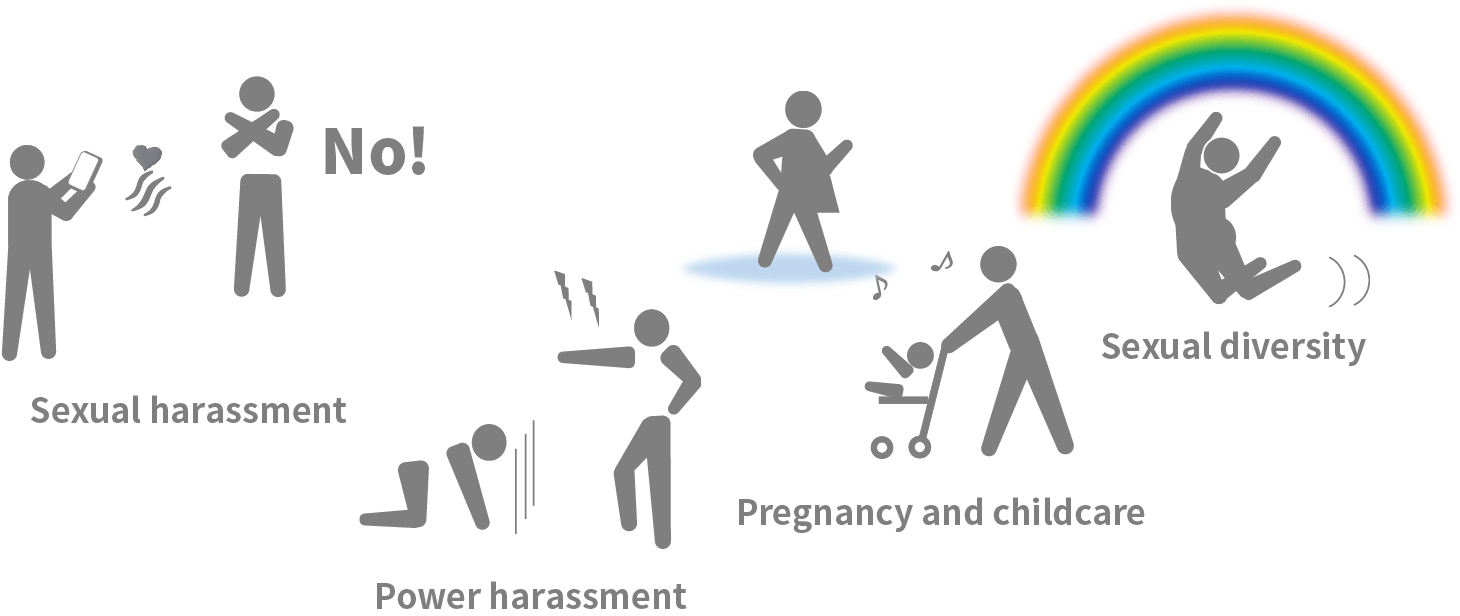
Responding to Discrimination (Buraku discrimination issue)
In addition to the above efforts, the TEPCO Group has long been committed to taking action on discrimination against Buraku people and other groups. We continue to do so through responses based on the Policy.
Responding to Discriminatory Graffiti
Discriminatory graffiti is sometimes found on the TEPCO Group’s electric power equipment and other facilities. To avoid becoming complicit in such human rights violations, we established a section in our intranet’s human rights portal site that focuses on how to counter discriminatory graffiti on our facilities. This section provides a manual on specific actions to be taken when such graffiti is discovered, an incident report form, and information on past cases. We take steps to encourage all Group companies to make use of these resources and join in our commitment to swiftly take proper action whenever discriminatory graffiti is discovered.
Fair Recruitment
In line with the Policy, the TEPCO Group fairly screens applicants by respecting their fundamental human rights, so as to ensure equal employment opportunities.
- Coordinators for screening for fair recruitment and awareness for human rights are appointed and notified to the responsible Public Employment Security Office.
- We set up a section on fair hiring and screening practices on our intranet’s human rights portal site. The section offers training resources and human rights-related information regarding hiring.
- When recruiting, we provide in-advance training on fair screening to new recruiters and interviewers.
-
TEPCO has been included in a MHLW publication showcasing ten companies with best practices in prevention of harassment in recruitment.
Preventing Harassment against Job-seeking Students (for businesses)
■ MHLW publication on companies’ best practices in recruitment harassment prevention (TEPCO is presented on p.38; in Japanese)
Human Rights Reporting Desk
Access our Human Rights Reporting Desk, which is open to our stakeholders, from the link below.
Human Rights Reporting Desk
TEPCO HD has a Human Rights Reporting Desk open not only to employees but also to all other stakeholders, including our customers, local community members, clients, and people who work in the supply chain.
When we receive a whistleblowing report, the responsible division will investigate, consider a remedial measure, and request related departments to remedy the situation.
We protect the privacy of the whistleblower and prohibit retaliatory acts. Further, TEPCO never subjects whistleblowers to disadvantageous treatment for making reports.
Whistleblowing report handling
- To maintain fairness, we outsource the report reception process. This means you will be redirected to an external website specifically tailored to receiving reports.
- For the sake of information security, we ask you to initially provide only an overview of your situation. The responsible division will individually contact you through email to check detailed information.
- We will read the content of your report on the next business day following the day on which your report is posted (excluding days we are closed: weekends/holidays/New Year’s holidays). Please be advised that depending on the content of your report, we may take time to respond, and we may be unable to respond in some cases.
- Our response is sent individually to the person who filed the report. Please do not copy or make secondary use of our response.
- Please do not file reports that are unrelated to us or are intended for slander. We will not respond to such reports.
Human Rights Reporting Desk (Japanese)
When you click here, you will see the screen shown on the right. Enter the following ID and password to use the system.
Password: tepco
